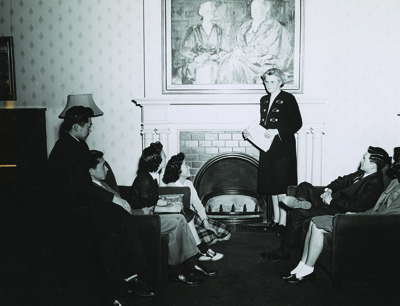A Matter of Trust

Warren Uchimoto ’45 (second from left) listens intently to Dean Frances Blanchard as she speaks to a group of Japanese-American students.
“I’m an old-timer. I’ll be 90 very soon,” says Warren Uchimoto ’45, a retired engineer who was eager one sunny summer day to talk at length and with great affection of his two-and-a-half years as a Swarthmore student. Uchimoto was one of 10 Japanese Americans who left internment camps in the West to find refuge and a rewarding education at Swarthmore during World War II. Though he’s been back to campus only once in the last 68 years—in 1984—the contributions the College has made to his life have been ever on his mind.
Now he’s decided to make his own contribution—by donating a valuable rental property to a charitable trust and having the trust sell the property. Two-thirds of the money is designated for Swarthmore, which provided him room and board 70 years ago; one-third is allocated for the Presbyterian Church, which paid his tuition.
In turn, the trust provides Uchimoto with a generous supplemental retirement income. “The income makes it nice for me. There will still be enough left for the College and church to benefit from the trust.” Uchimoto has earmarked the remaining funds for student financial aid—“to help disadvantaged students.”
Setting up the trust also relieves him of the burden of management. “In the past I was renting out the property,” he says. “Now I don’t have to deal with maintenance issues, and the ultimate proceeds of the trust go to a very worthwhile cause. It allows me to do something for the benefactors of my youth. It’s a good thing for other people to do, if they can.”
Uchimoto’s connections to the College actually began back at Gila River Relocation Center in Arizona. After the Pearl Harbor attack, his family was uprooted from California—Warren was attending the University of California–Berkeley at the time—and placed in the camp. He was one of about 5,000 Japanese-American students released from the camps to attend colleges and universities, due to the efforts of the National Japanese American Student Relocation Council, which was chaired for two years by Swarthmore President John Nason.
Shortly before Uchimoto boarded a train to head for Swarthmore, he was summoned to meet with the camp’s chief executive. “I thought, ‘Good heavens, what have I done?’ He [Lewis Korn ’26] put me right at ease.” Korn revealed that he was a Swarthmore graduate. Korn kept in touch with Uchimoto, and he and his wife attended Warren’s graduation in 1945. The Korns, as well as Dean Everett Hunt, President Nason, Mary Sullivan Patterson ’28, and College treasurer Nicholas Pittenger and his wife Cornelia, made Uchimoto feel welcomed and supported.
“Alma mater means foster mother in Latin,” Uchimoto remarks. “Swarthmore in a literal sense was a foster mother for me and others from the internment camps, because our families and homes were so far away. The privilege of going to Swarthmore enabled me to be gainfully employed in the engineering profession and to lead a nice middle-class life. For that, I’ve always been grateful.”
 Email This Page
Email This Page